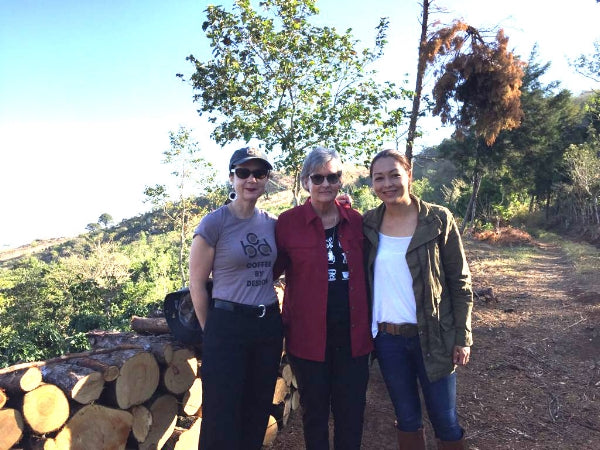
Meet the Grower: Celeste Fumagalli — RED ROCK ROASTERS


Mary Allen Lindemann, Nancy Langer, and Celeste Fumagalli. February 2018.
Here at Red Rock, we aim to be leaders in integrity and transparency.
So we thought—radical transparency would be letting our colleagues tell their own stories to our customers. What follows is an interview with Celeste Fumagalli. Her company is Gold Grains, located in Conguaco, Jutiapa, Guatemala. This year she was a Finalist in the Ernesto Illy International Coffee Awards.
I think you’ll find her story as remarkable as we have.
RL: How did you start working in coffee?
CF: I grew up and helped my father at the farm since I was a little girl. Almost every weekend and holiday we spent on the farm. Unfortunately my father died in 2007 and left me managing and helping my mom with the farm. That's why I always say that my love for coffee is owed to my father. Thanks to him, leaving us with his great example of labor and a number of teachings, I have became a woman dedicated to coffee.
After selling our products to an intermediary for a long time, in 2013, he obtained our harvest and never paid. This left us in a difficult position as a family, as we highly depended on the harvest income, not only in order to continue working, but also for a living.
Armed with new courage and a lot of faith, we promised ourselves not to sell our cherry coffee again, and we applied for loans in the banks to continue operating. In search of new opportunities, in August 2013, together with my husband Roberto, we founded the company Gold Grains, and in less than 5 months we built the first wet mill in Conguaco.
Ripe cherries waiting to be processed at the mill.
RL: How has your business changed over the years?
CF: We started selling cherry coffee and now we are processing and exporting in green.
We also have made some changes in agriculture management and focus in finding new varieties that have potential for cup quality.
RL: What would you like roasters and consumers to know about your coffee?
CF: Buy our coffee. We are dedicated farmers and we need you to continue the business. Behind every cup of coffee that you drink there are many hands in between, and the only thing we want is to have a decent life for ourselves, for our workers and their families.

Pergamino coffee drying at the mill.
RL: How did you get involved with the IWCA (International Women’s Coffee Alliance)?
CF: I'm an active member of Asociación de Mujeres de Guatemala (IWCA Guatemalan Chapter) since 2013. I immediately identified with the mission of the association and took all the courses and field tours.
In 2014 I started as a volunteer to organize the Third Grafting Competition. I had a big desire to learn everything about coffee, and it was easy to get familiarize with other women. So I was called to be part of the board of member as the secretary. My position required me to organize and update the minutes and support the chairwomen in all the events that were organized. We met once a month and followed up on the projects. In this position I learned a lot from the other board members, and I felt proud to be able to participate.
My first big challenge was when I represented our Association in Bogota in February 2015, in the Conference of Good Practices of Gender Equity, and to present our experience and the work that was done in the Association for Women in Coffee. On my return we had organized the General Assembly, and it was a pleasant surprise that I was named Chair of the Board. One year later the General Assembly requested my support and I was re-elected. An unforgettable experience, a lot of work, and a very big responsibility. But I feel honored to have been able to do my bit, and open opportunities for other women in coffee. Right know I'm not at the board, but happily support the chair, every time it's needed.
RL: What is your favorite part about coffee?
CF: Everything!!! Coffee is my life. But what I loved most is the smell of a fresh roast and see the faces of the people trying it.
RL: What is the hardest part about coffee?
CF: There are several hard parts about coffee. Since the seed is chosen, the plants are taken care of, the crop is harvested at the opportune point, the milling, all the processes have their risks. One mistake at one point and all the hard work of years can be lost. But the hardest thing of all, I would say is to find fair prices for all our coffee.

Ripe cherries waiting to be processed at the mill.
RL: How has your business changed over the years?
CF: We started selling cherry coffee and now we are processing and exporting in green.
We also have made some changes in agriculture management and focus in finding new varieties that have potential for cup quality.
RL: What would you like roasters and consumers to know about your coffee?
CF: Buy our coffee. We are dedicated farmers and we need you to continue the business. Behind every cup of coffee that you drink there are many hands in between, and the only thing we want is to have a decent life for ourselves, for our workers and their families.

Celeste’s husband, Roberto, in the field.
